Related Research Articles

María Guadalupe Araujo Yong, better known as Ana Gabriel, is a Mexican singer and songwriter. During her long career, she has performed different genres of music and has received several accolades. As a result, she has been called La Diva de América and La Luna de América.
Billboard Hot Latin Hits is a series of compilation albums released by Rhino Records in 1998, featuring hit Latin music recordings from the 1980s and 1990s.

Pecado Original(English: Original Sin) is the third studio album by Mexican singer Ana Gabriel. It was released by CBS Records on December 8, 1987. The album was produced by Mariano Perez Bautista.
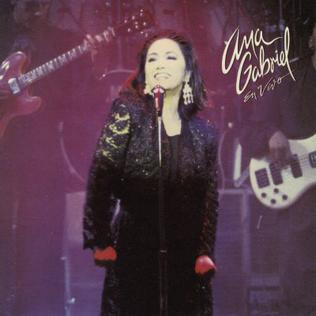
En Vivo is the sixth album by Mexican pop singer, Ana Gabriel. It was released on 1990. This album reached No. 1 in the Billboard Latin Pop Albums. This was her first live material and was nominated for Pop Album of the Year at the Lo Nuestro Awards of 1992.
"De Mí Enamórate" is a ballad written by Mexican singer-songwriter Juan Gabriel, and performed by Mexican singer-songwriter and actress Daniela Romo. The song was produced by Gian Pietro Felisatti and co-produced by Miguel Blasco. It was released as the first single from her fourth studio album Mujer de Todos, Mujer de Nadie (1986).

"Soy Así" is a ballad written and produced by Spanish composer Rafael Pérez-Botija and performed by Mexican singer José José. It was released as the first single from his twenty fourth studio album of the same title (1987). This song became the second number-one single by the artist in the Billboard Hot Latin Tracks chart, after the single "¿Y Quién Puede Ser?" two years before. In 2005, Mexican late "singer" Valentín Elizalde recorded a cover version of the single and included it on his album of the same name.
"Simplemente Amigos" is a ballad written and performed by Mexican singer-songwriter Ana Gabriel and was produced by Mariano Pérez Bautista. It was released by CBS Discos on March 20, 1989, as the second single from her fourth studio album Tierra de Nadie (1988). The song became Gabriel's second number-one single in the Billboard Hot Latin Tracks chart after "Ay Amor" in late 1987. The success of the song led its parent album to its peak at number one in the Billboard Latin Pop Albums and approximate sales of six million units in Latin America.
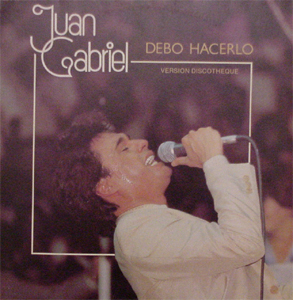
"Debo Hacerlo" is a dance song written, produced and performed by Mexican singer-songwriter Juan Gabriel. It was released as the first single from his compilation album of the same title (1987). This song became the last original song recorded by Gabriel, until 1994, due to a copyright dispute with BMG over his repertoire, and was later covered by Ana Gabriel, Nydia Rojas, Pandora, José Octavio and Aleks Syntek.
"Y Ahora Te Vas" is a song written and produced by Mexican singer and songwriter, Marco Antonio Solís. It was performed by him as the lead singer of Los Bukis. It was released as the second single from his 11th Grammy nominated studio album Si Me Recuerdas (1988). This song became their first #1 single on the Billboard Hot Latin Tracks chart.
"Qué Te Pasa" is a dance song written by J.R. Florez and Gian Pietro DiFelissati, produced by Felissatti and performed by Mexican singer Yuri. It was released in 1987 as the first single from her seventh studio album Aire (1987), and became her first number-one single in the Billboard Hot Latin Tracks chart and won the Lo Nuestro Award for Pop Song of the Year in 1989.
"Hombres al Borde de un Ataque de Celos" is a dance song written by J.R. Florez, produced by Gian Pietro Felisatti and Loris Ceroni, and performed by Mexican singer Yuri. It was released in 1988 as the first single from her studio album Isla del Sol (1988), and became her second number-one single in the Billboard Hot Latin Tracks chart after "Qué Te Pasa" in 1988. Isla del Sol was the first album recorded by the singer on CBS, her record label until 1995. This song became one of her staple on every live performance and was also included on the live album Vive la Historia.
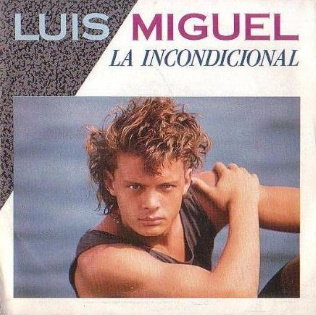
"La Incondicional" is a song written, produced, and arranged by Spanish musician Juan Carlos Calderón and performed by Mexican singer Luis Miguel. It was released in 1989 via WEA Latina as the third single from Miguel's sixth studio album, Busca una Mujer (1988). The song became his second #1 single on the Billboard Hot Latin Tracks chart after "Ahora Te Puedes Marchar" in 1987. The song broke several airplay records in Latin America, topping the charts in Mexico, Chile and Peru; and the top-ten in other countries. The success of the song helped push the album to #3 on the Billboard Latin Pop Albums with approximate sales of four million units.
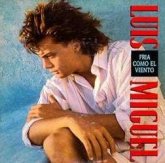
"Fría Como el Viento" is a ballad written, produced and arranged by Juan Carlos Calderón and performed by Mexican singer Luis Miguel. It was released as the first single from the Grammy-nominated studio album Busca una Mujer (1988). The song became the third number-one single for the singer in the Billboard Hot Latin Tracks chart after "Ahora Te Puedes Marchar" in 1987 and "La Incondicional", the preceding single.
"Quién Como Tú" is a ballad and title track written and performed by Mexican singer-songwriter Ana Gabriel. It was produced by Óscar Gómez for Gabriel's fifth studio album Quién como tú (1989). Released as the second single from the album, the song became the third number-one single for the singer in the Billboard Top Latin Songs chart in May of the same year. Live performances of the song can be found on the albums En Vivo (1990) and ...En la Plaza de Toros México (1998).

"Es Demasiado Tarde" is a song written and performed by Mexican singer-songwriter Ana Gabriel. It was released in 1990 by CBS Records and first included on the compilation album México, Voz y Sentimiento which also featured songs performed by Luis Angel, Vikki Carr, Aida Cuevas, Lorenzo de Monteclaro, Antonio De Jesús, Pedro Fernández, Hermanas Huerta, Tania Libertad, Angelica Maria, Lucía Méndez, Angeles Ochoa, Gilberto Parra, Gerardo Reyes, Cuco Sánchez, Cecilia Toussaint, Yuri and Flor Yvon. The song became Gabriel's fourth number-one single in the Billboard Top Latin Songs chart, after "Ay Amor", "Simplemente Amigos" and "Quién Como Tú". Personalidad: 20 Éxitos was the first Gabriel album to include the song. "Es Demasiado Tarde" is a song about a woman who refuses to take her lover back after the end of their relationship. Gabriel also addressed this issue in her song "Tú lo Decidiste" in 1994. The song earned the Lo Nuestro Award for Best Pop Song.
"Todo, Todo, Todo" is a song written by Jorsaci, produced by Bebu Silvetti, and performed by Mexican singer-songwriter and actress Daniela Romo. It was released by EMI Latin in 1991 as the second single from Romo's sixth studio album Amada más que nunca (1991). The song became the second number-one single for Romo in the Billboard Top Latin Songs chart, after "De Mí Enamórate" five years prior. Romo earned two nominations at the Lo Nuestro Award in 1992 for the track, Pop Song of the Year and Best Music Video, winning the latter. "Todo, Todo, Todo" has a choreography which is a staple at Filipino informal/formal (hall) parties. The video received a Billboard Music nomination for Latin Video of the Year by a Female Artist.
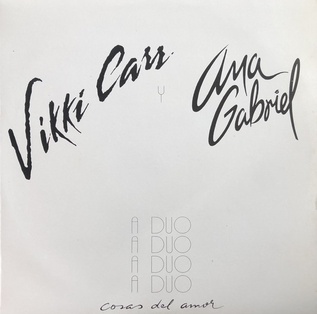
"Cosas del Amor" is a song by American recording artist Vikki Carr and Mexican singer-songwriter Ana Gabriel. It was released as the lead single from Carr's studio album Cosas del Amor (1991). Written by Roberto Livi and Rudy Pérez, the song portrays the relationship between two friends and confidences between both due to marital problems of one of them.
"Detrás de Mi Ventana" is a Latin pop song by Mexican recording artist Yuri from her studio album Nueva Era (1993). The track was written by Guatemalan singer-songwriter Ricardo Arjona. It was released as the lead single in Latin America and the United States, peaking atop the Billboard's Latin Songs chart, becoming the third number-one song in the chart for the singer and the first for Arjona as a songwriter.
This is the singles discography for Mexican singer Ana Gabriel.
References
- ↑ "¡Ay, amor!- Performers". Allmusic. Macromedia Corporation. Retrieved 9 June 2009.
- 1 2 3 4 "Biografía de Ana Gabriel". Sociedad de Autores y Compositores de México (in Spanish). Retrieved 8 May 2009.
- 1 2 "Pecado Original – Ana Gabriel". Allmusic. Macromedia Corporation. Retrieved 8 May 2009.
- ↑ AMPROFON. "Los 100 Discos Más Vendidos de la Década de los 80s". Archived from the original on 9 July 2012. Retrieved 9 June 2009.
- ↑ "¡Ay, amor!- Week of November 21, 1987". Billboard. Nielsen Business Media, Inc. 2 November 1987. Retrieved 9 June 2009.[ dead link ]
- ↑ "¡Ay, amor!- Week of December 12, 1987". Billboard. Nielsen Business Media, Inc. 1 December 1987. Retrieved 9 June 2009.[ dead link ]
- ↑ "¡Ay, amor! – Week of January 23, 1988". Billboard. Nielsen Business Media, Inc. 2 January 1988. Retrieved 9 June 2009.[ dead link ]
- ↑ "¡Ay, amor! – Week of April 30, 1988". Billboard. Nielsen Business Media, Inc. 21 March 1987. Retrieved 9 June 2009.[ dead link ]
- ↑ Brito, Joel (3 July 2008). "Flex invencible en Billboard Hot Latin Songs". Billboard en Español. Nielsen Business Media, Inc. Archived from the original on 16 July 2011. Retrieved 10 April 2009.
- ↑ "Discos más populares en Latinoamérica". El Siglo de Torreón (in Spanish): 74. 4 June 1988. Retrieved 15 July 2022.
- ↑ "Discos más populares en Latinoamérica". El Siglo de Torreón (in Spanish): 73. 4 June 1988. Retrieved 15 July 2022.
- ↑ "Los Discos Más Populares - Notitas Musicales (15 February)". Facebook . Retrieved 4 October 2020.
- ↑ "Ana Gabriel Chart History (Hot Latin Songs)". Billboard. Retrieved 15 July 2022.
- ↑ "Topping The Charts Year By Year". Billboard. Vol. 110, no. 48. Nielsen Business Media, Inc. 28 November 1998. p. LMQ3. Retrieved 17 December 2018.
- ↑ "Greatest Of All Time Hot Latin Songs Chart". Billboard. 2021. Archived from the original on 23 September 2021. Retrieved 23 September 2021.